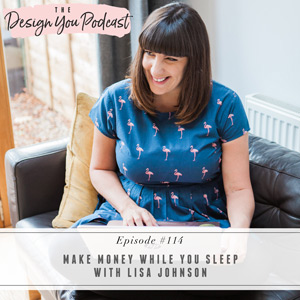
Have you ever wished you could make money while you sleep? Do you know you have the potential to earn more, but just don’t know where to start? Well, today’s guest is the answer to your problems! England’s very own ‘passive income queen’ Lisa Johnson joins us to share how she went from earning low six figures in her business to earning seven figures over the last 18 months, because of her passive income. Sound too good to be true? It’s not! She’s here today to tell you how you can do it too.
Passive income doesn’t just happen overnight. It requires hard work, commitment, and perseverance. Whether you want to generate more money via your business, or cash in on your hobby, there are so many ways to use the skills and knowledge that you already have to create recurring revenue. It can be hard to know where to start, but Lisa has a tried and tested step-by-step system to guarantee that extra income.
Tune in this week to hear how showing up for yourself and your business is crucial when creating a passive income stream. We’ll show you why polarising people isn’t necessarily a bad thing, and why people will always pay to learn what you know. If you’re willing to do whatever it takes to build it, there’s no reason you can’t succeed! Are you ready to make money while you sleep? We’re ready to show you how friends!
If I’ve inspired you to push yourself further into what’s possible for your business or life, and you’re ready to make money hand over fist, I’d love for you to join me in the DesignYou coaching program. I can’t wait to help!
If you want to keep this conversation going, you have to join my free Design You Podcast community on Facebook. We have great conversations over there about the podcast episodes and our podcast guests are in there too! So head on over and I’ll see you there!





